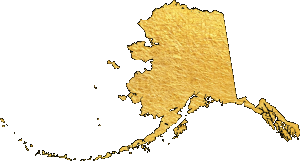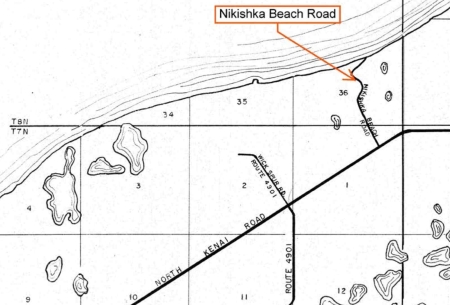
"The case arose from OSK's unilateral decision to block public access via Nikishka Beach Road to Nikishka Beach in North Kenai. In 2007, OSK, a Cook Inlet dock owner and oilfield services supplier, erected a gate and manned it with an armed security guard ahead of the westerly terminus of Nikishka Beach Access Road." This action blocked public access to the beach from the state-owned and maintained road." The Kenai Superior Court issued it's decision on March 11, 2010. "Judge Moran ruled that the state road goes all the way to the beach by virtue of a number of legal instruments, and that the public also enjoys prescriptive easement to the beach on both sides of OSK's dock." (Quote from 2010 DOT&PF In-Transit newsletter)

At the time of this case I was DOT&PF NR ROW Chief. I was requested to provide expert testimony as to the nature and validity of the existing public right-of-way for Nikishka Beach Road. One of OSK's arguments was that the any public ROW that existed for Nikishka Beach road was terminated by merger of title when the State received patent to lands partially crossed by the road. This is an important issue because it often arises in discussions of easement validity or DOT/DNR land management when it is suggested that federally granted highway easements including material sites were terminated when the State receives patent to the lands they cross. The Court disposed of this argument in their Order On Summary Judgment dated 7/9/09. "The Merger Doctrine originates from the idea that person cannot have an easement in his or her own land because their general right of ownership comprehends all possible uses. Public easements, however, differ from private easements in the allocation of interests. Beneficial rights in publicly held easements are split into use and control rights. The right to control and manage the servitude for the benefit of the public is located in the State. The right to use the servitude rests with the public. While control of the benefit includes the right to transfer, terminate, or otherwise dispose of the servitude benefit, legal title does not trigger the doctrine of merger for the purposes of a public easement. To find otherwise would mean that all public roadways deeded to the State of Alaska by quitclaim deed by the federal government in 1959 were automatically vacated upon issuance of the federal patent for the remainder of these lands in 1962."
An appeal to the Supreme Court in 2012 affirmed the Superior Court's ruling that the 1980 State patent to the Kenai Borough reserved a valid easement for public access to the shoreline of Cook Inlet, it did not address alternative rulings. Ultimately, my testimony was not necessary. So it goes.
| Date | Documents |
|---|---|
|
3/10/09 |
Nikishka Beach Road Report - jfb Expert Report |
|
7/27/12 |
Offshore Systems Kenai v. SOA DOT&PF Summary - for Supreme Court Decision |
| Media | |
|
6/28/08 |
Nikiski Beach Closure - Anchorage Daily News |
|
3/12/10 |
Nikiski Beach Access Restored - Peninsula Clarion |
|
2010 |
Favorable Court Ruling in Nikishka Beach Case - DOT&PF In-Transit Newsletter |
|
6/29/08 |
Nikiski Beach Protest - Peninsula Clarion |
|
7/4/08 |
Nikiski Beach Public Access Study - Peninsula Clarion |
|
4/12/09 |
Beach Access Case goes to Court - Peninsula Clarion |
| Research | |
|
10/27/08 |
Alaska Highway System Log - Listing Nikishka Beach Road |
|
1/19/09 |
|
|
n/a |
Nikishka Notes - jfb |
|
10/28/98 |
State v. Harrison - Railroad/PLO - US District Court Alaska |
|
1951 |
|
| Research - ARC/BPR | |
|
10/17/11 |
email chain - jfb & DOT ROWE |
|
1953 |
|
|
1953 |
|
|
1954 |
|
|
1954 |
|
|
1957-59 |
|
|
8/25/54 |
ARC Anchorage District Report - Including Nikishka road reference |
|
12/15/54 |
ARC Anchorage District - Contracts & Surveys - Reports (2mb) |
|
12/16/53 |
|
|
12/16/54 |
Anchorage District Annual Report - Including Monthly Reports (4mb) |
|
12/11/50 |
ARC Farm Roads - Anchorage District (7mb) |
|
2/6/51 |
ARC
Order No. 40 - (3mb) |
|
3/3/55 |
|
|
1/1/49 |
ARC Memos - Road standards, Abandonment of Roads, etc. |
|
8/11/52 |
|
|
6/11/53 |
|
|
1/12/56 |
|
|
1/20/54 |
|
|
1/3/55 |
|
|
1/31/57 |
|
|
3/30/54 |
|
|
3/16/00 |
Index of Place Names Found in the Records of the ARC - 1919 - 1959 (4mb) |
|
1/1957 |
North Kenai Vicinity Map - Bureau of Public Roads |
|
6/30/59 |
Omnibus Quitclaim Deed - Nikishka Beach road |
|
varies |
Public Land Orders 601-2665-1613 - Highways |
| Research - ARC/BPR - Maps | |
|
6/12/23 |
T8N R12W SM - Township Plat |
|
1/1957 |
North Kenai Vicinity Map - Bureau of Public Roads |
|
5/14/06 |
|
|
3/8/09 |
Mazie Mcgahan Abstract - BLM Online |
|
1/12/66 |
Nikishka Beach Road from Wildwood North - ROW Maps Department of Highways |
|
6/8/07 |
BLM Master Title Plat - T7N R12W SM |
|
6/8/07 |
BLM Master Title Plat - T8N R12W SM |
|
n/a |
Alaska DNR Land Estate Map - T8N R12W SM |
|
n/a |
State DNR Historical Index 1 - T8N R12W SM |
|
n/a |
State DNR Historical Index 2 - T8N R12W SM |
| Research - Issues | |
|
n/a |
Appropriation by Federal Use - notes from Chistochina Dike |
|
n/a |
Shultz Case - Cited in Beardsley's Access presentation |
| Research - Issues - Estoppel & Laches | |
|
varies |
Keener
Superior Court - Memorandum Decision, memos, AGO |
|
2/17/95 |
Keener v. State - Supreme Court |
|
2/17/89 |
Messerli v. State - Supreme Court |
|
5/27/83 |
State v. Alaska Land Title Ass'n - Supreme Court |
|
12/9/64 |
State v. Simpson - Supreme Court |
| Research - Issues - Meger of Title | |
|
1/15/96 |
|
|
2/5/14 |
Merger of Title - jfb notes |
|
6/13/96 |
PUE's & Merger of Title - AGO Memo |
| Research - Issues - Prescription | |
|
n/a |
Prescription while land in public domain - Law of Easements and Licenses |
|
2007 |
Prescriptive Easements Paper - Beardsley |
| Superior Court | |
|
2/24/09 |
|
|
12/22/14 |
Recorded Order on Survey - Order Granting Joint Motion for Approval of Survey |
|
3/11/10 |
|
|
3/10/10 |
|
|
3/15/10 |
email AAG Nikishka Beach - to jfb |
|
3/23/10 |
|
|
4/10/09 |
SOA Reply to Opposition Motion - (3mb) |
|
4/2/09 |
Seventh Supplemental Disclosures - (2mb) |
|
4/3/09 |
|
|
4/6/10 |
|
|
5/5/09 |
|
|
6/2/10 |
|
|
7/17/09 |
|
|
7/19/09 |
|
|
7/21/09 |
|
|
7/9/09 |
|
|
n/a |
|
| Superior Court - 1/9/09 State v. OSK Documents | |
|
1/9/09 |
|
|
varies |
Map Attachments - (3mb) |
|
1964 |
|
| Superior Court - 2/11/09 State v. OSK Documents | |
|
1/22/09 |
|
|
2/11/09 |
|
|
2/5/09 |
|
|
5/22/08 |
State v. OSK Complaint - (2mb) |
|
n/a |
|
|
7/5/61 |
|
|
3/7/60 |
|
|
10/30/63 |
|
|
1/27/09 |
|
|
12/19/08 |
|
|
12/19/08 |
McGahan Deposition - (2mb) |
|
6/27/08 |
|
| Superior Court - 2/13/09 McLane Report | |
|
2/3/09 |
|
|
varies |
McLane Expert Exhibits - (4mb) |
|
3/16/09 |
|
| Superior Court - 2/28/11 OSK | |
|
2/14/11 |
Joint Motion for Approval of Survey Pending Outcome of Appeal |
|
2/17/11 |
Order Granting Joint Motion for Approval of Survey Pending Outcome of Appeal |
|
2/10/11 |
|
| Superior Court - 3/27/09 State v. OSK Motion | |
|
3/27/09 |
OSK Reply Opposition - (4mb) |
|
varies |
Exhibits 19-38 - (8mb) |
|
7/28/92 |
|
|
7/9/92 |
|
|
4/1/09 |
|
| Superior Court - 3/4/09 Kenai Motion | |
|
3/4/09 |
|
|
6/9/67 |
Myers v. United Statesdf - US Court of Claims |
|
2/5/64 |
Olson v. McRae - Alaska Supreme Court |
|
12/31/08 |
Sowinski v. Walker - Alaska Supreme Court |
| Supreme Court | |
|
10/14/11 |
|
|
7/12/12 |
|
|
7/12/12 |
|
|
varies |
Docs for Bennett - references related to case |
|
6/24/11 |
State of Alaska Brief - (2mb) |
|
3/2011 |
OSK Opening Brief - (2mb) |
|
7/2011 |
|